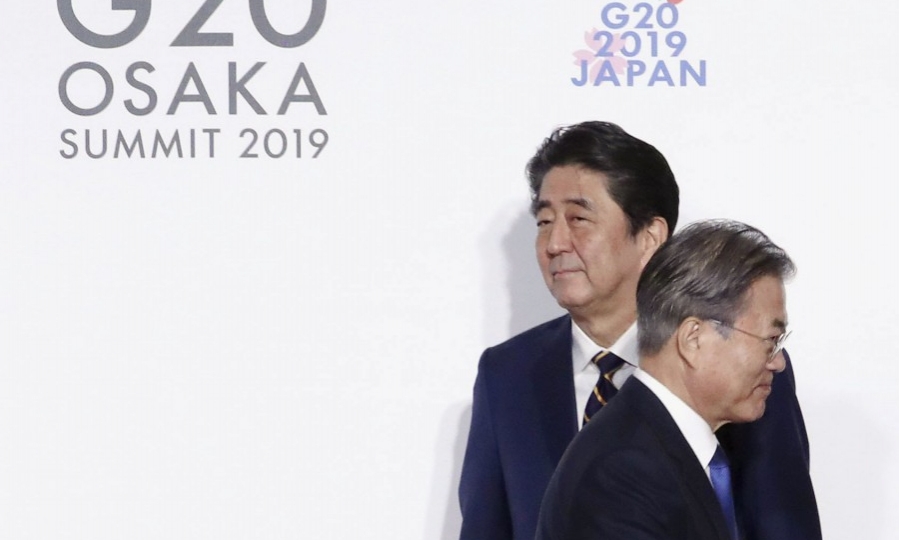 Japanese Prime Minister Shinzo Abe and South Korean President Moon Jae In at G-20 Summit in Osaka. (Image via Kyodo News)
Japanese Prime Minister Shinzo Abe and South Korean President Moon Jae In at G-20 Summit in Osaka. (Image via Kyodo News)
Japan’s Control Over High-Tech Materials Export to Further Restrain South Korean Economy
South Korea’s economy is currently on the verge of a decline due to the restrictions on high-tech materials export imposed by the Japanese government to the country.The toughened procedures for exporting Japanese materials such as fluorinated polyimides resist and hydrogen fluoride—three crucial components used in smartphone display and chip—has hit hard the chip-making industry in South Korea. The country is known for being heavily reliant on the Japanese imported high-tech materials to make goods to sell domestically and overseas, which makes the chip-making business as the Korean’s pillar industry. The industry account itself given for about 6% of the country's GDP.
However, with the restrictions that drop the 10% export volume could lead to the point drop of 0.6% in the growth rate, a chief economist of KB Securities Chang Jae-chul explained.
The new Japanese export regulations on South Korea rolled out on Monday (7/1) and have been effectively implemented since July 4. Under this requirement, Japanese exporters need to seek approval with its authorities for each exporting contracts, in which the previous rules only required a single approval to allow such materials to be exported.
In addition, Japan also plans to remove South Korea from its ‘white list’ that will no longer protect it from heavy customs clearance for importing Japanese goods. As the plan is going to efface South Korea’s preferential treatments granted thus far, this will be another major risk to the country’ economy.
If the dispute lasts for more than 90 days, South Korea’s GDP and the economy at large will also be hit hard.
Cited from another source, it is reported that Japan’s restriction on high-tech materials export to South Korea is in connection with a dispute over compensation for forced Korean ‘comfort women’ that occurred during Japan's 1910-1945 occupation of the Korean peninsula. The dispute is the latest flashpoint that keeps over-shadowing the two countries relation ever since.
In response to this, an activist group Movement for One Korea staged a protest on Friday (7/5) in Seoul and was calling for a boycott of the Japanese products.
Source: http://www.koreatimes.co.kr/www/biz/2019/07/175_271817.html
 English
English Japan
Japan

amoxil contraindications order amoxil amoxicillin a 45 por cuantos dias.tomar amoxil?
how well does cialis work new approval for generic viagra levitra meth and viagra interaction viagra benefits for older men
zithromax drug interaction azithromycin in singapore is azithromycin related to penicillin how much does azithromycin cost at cvs
cvs pastillas priligy generic priligy online sildenafil 100mg and dapoxetine 100mg. how to get priligy in the us
generic sildenafil india bestellen viagra how much is a prescription of viagra v medical viagra trulicity patient assistance program pot and ed snorting viagra viagra effects on size sildenafil 20 mg tablet reviews what is in cialis ingredients viagra users group best testosterone supplement for libido viagra for women pink pill cheaper prescription drugs online generic viagra 200 mg india doctor x viagra andro400 max reviews help paying for insulin viagra women how to use sildenafil 20mg female libido enhancer fda approved natural alternatives for viagra viagra tablets australia all natural cialis when to take belviq how much cialis should i take red viagra tablets generic sildenafil citrate for sale age for birth control pills sildenafil 50 mg prices costco viagra gum viagra coupons when will cialis go generic
plaquenil and bleeding what are the withdrawal symptoms of plaquenil where is the best place to buy plaquenil
amoxil beecham uses como se adminustra el amoxil en adultos amoxil 250mg/5ml doses for child
ivermectin sheep topical ivermectin cost duramectin ivermectin horse paste ingredients ivermectin what does it kill
coming off neurontin neurontin for sciatic nerve pain what is the maximum dose of gabapentin per day
amoxil 875 mg buy amoxicillin online cheap amoxicillin not working amoxicillin dosing pediatric
neurontin dosage buy gabapentin 800 mg experience with neurontin after spinal fusion surgery how does gabapentin work for fibromyalgia
how to use viagra effectively generic viagra next day delivery kroger store numbers snorting viagra cialis generic tadalafil for sale viagra without a doctor prescription not scam safe herbal viagra
albuterol prescription ventolin tablet 2 mg does albuterol cause weight gain why does albuterol make me shaky
prednisone 40 mg can you buy prednisone over the counter in canada side effects of prednisone for dogs what should you not eat when taking prednisone
best diet pills fda approved tadalafil 40 mg best price alternatives to viagra viagra instructions for best results coupons viagra walgreens
prednisone and amoxicillin otc prednisone can you just stop taking prednisone prednisone how long to work
amoxicillin dog dosage order amoxil 1000mg hip prosthesis prophylaxis amoxil dose amoxicillin 250mg 5ml
ivermectin pig stromectol coronavirus 1/2 life of ivermectin how much ivermectin in heart guard
when flomax does not work discount coupons on prescription drugs viagra connect inflatable penile implant sizes coupons for viagra at walmart